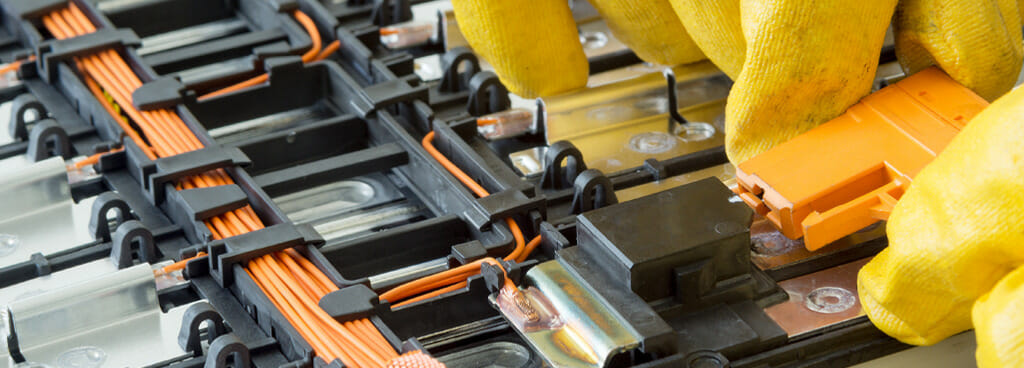- Home
- Services/IndustriesServicesindustries
- About Us
- LocationsStatesAccordion ContentAccordion ContentAccordion ContentAccordion Content
- Job Openings
- Quick Links
- ATS Family

Chemical Testing EV Batteries
ATS’ A2LA-accredited Chemical Analysis Lab offers a variety of methods and services for chemical testing EV batteries. Our experts deploy powerful technology to precisely identify the material properties and reactions of each component for a thorough evaluation of the product’s makeup. Our work enables manufacturers to evaluate their product’s safety and quality before deciding on their next steps.
Gas Chromatography/Mass Spectrometer Analysis (GC-MS)
Gas Chromatography/Mass Spectrometer Analysis (GC/MS) identifies and quantifies chemicals in a sample. For example, when confirming a lithium-ion battery complies with lithium quantity regulations, ATS experts can use GC/MS to separate lithium from the other materials and measure its concentrations. Our powerful technology can detect organic compounds with trace levels as low as parts per trillion (ppt). For quick and accurate results, ATS uses an autosampler that holds up to 150 sample vials at a time.
Thermogravimetric Analysis (TGA)
Thermogravimetric Analysis (TGA) is a versatile procedure for evaluating a substance’s weight loss over time when subjected to extreme temperature changes, such as heating and cooling. ATS performs TGA to measure a battery’s properties and study its reactions in a temperature-controlled nitrogen or air environment. TGA provides information about a material’s:
- Oxidative stability
- Thermal stability
- Exothermic and endothermic properties
- Volatile content
- Composition
Differential Scanning Calorimetry (DSC)
Differential Scanning Calorimetry (DSC) measures energy flow during thermal transitions as a function of temperature. DSC helps clients make informed decisions regarding material selection and quality control. Our experts use DSC to determine a material’s melting point, heat capacity, thermal conductivity, and the temperature it reaches during phase changes. DSC also provides a method of identifying and measuring the following:
- Total energy released during crystallization
- Total energy absorbed during melting
- Glass transition temperature (Tg)
- Oxidation energy
- Oxidation Temperature
- Thermal stability
- Heat of fusion
X-Ray Diffraction (XRD)
The ATS metallurgy lab performs X-Ray Diffraction, commonly referred to as XRD or XRD analysis, without destroying the sample material. XRD exposes the sample to x-ray beams that scatter the material’s compounds in a unique diffraction pattern. We use this process to identify the material in the International Centre for Diffraction Data (ICDD) database.
ATS uses XRD to confirm a battery’s material composition and identify any impurities that may cause adverse reactions down the line. We can also apply this process to inform design and development improvement plans, reverse engineer a composite, and perform failure analysis.
XRD provides information about a material, including:
- Composition
- Crystal structure
- Properties
- Functionalities
- Qualities
Standards
Our experts perform chemical testing on EV batteries in compliance with industry standards such as:
- ASTM D934
- ASTM E1131
- ASTM E1641
- ASTM E1868
- ISO 11358
- IEC 62660
About ATS
Founded in 1967, ATS provides consulting engineering, calibration, inspection, and testing services to clients nationwide and abroad. We continue to expand our vast service network and list of capabilities through the furthered development of the ATS Family of Companies.
ATS operates an ISO 9001 Quality Management System for product, material, chemistry, and nondestructive testing and calibrations. Our labs are also A2LA-accredited in ISO/IEC 17025:2017 calibrations and testing. Additionally, we run a CPSC-approved lab that offers a comprehensive list of services and testing capabilities. To learn more about our quality standards and certifications,
click here.
Contact Us
Call +1 (888) 287-5227 to speak with us about how ATS can help ensure the safety and quality of your EV battery through chemical testing. To schedule a chemical test, please call our number or complete the request form on this page.

Request Form
"*" indicates required fields
Battery Testing Links
- Abuse Testing Lithium Ion Batteries
- Battery Abuse Testing
- Battery Chemical Analysis
- Battery Durability Testing
- Battery Electrical Testing
- Battery Impact Testing
- Battery Management Systems BMS Testing and Certification
- Battery Performance Testing
- Battery Safety and Certification Testing
- Battery UL Certification
- Battery Vibration Testing
- Chemical Testing EV Batteries
- Electrical Testing EV Batteries
- Electrical Vehicle Battery Testing
- E Mobility Battery Testing
- Energy Storage System ESS Testing and Certification
- E Scooter Battery Testing
- EV Battery Testing Lab
- EV Battery Mechanical Testing
- EV Battery Pack Vibration
- EV Battery Thermal Testing
- High and Low Temperature Testing EV Battery
- Hoverboard Battery Testing
- IEC 60896-21 Stationary Valve-Regulated Lead-Acid Batteries
- IEC 61427 Secondary Cells and Batteries for Photovoltaic Energy Systems Testing
- IEC 62133 Lithium Battery Safety Testing and Certification
- IEC 62133-2 Lithium Ion Battery Testing Certification
- IEC 62619 Secondary Cells and Batteries Containing Alkaline Testing
- Lead Acid Battery Testing
- Mechanical Testing EV Batteries
- Micro Mobility Battery Testing
- PNNL 22010 ESS Performance Testing
- RESS Safety and Abuse Testing
- RTCA/DO-311 Performance Testing Lithium Batteries
- SAE J1798 Performance Rating of EV Battery Modules Testing
- SAE J2185 Life Testing Heavy-Duty Storage Batteries
- Telcordia GR Battery Testing
- Thermal Testing EV Batteries
- UL 1642
- UL Battery Certification
- UL 1973 Battery Testing
- UL 1989 Standby Battery Testing and Certification
- UL 2054
- UL 2271 E Bike Battery Testing and Certification
- UL 2580 Electric Vehicle Battery Testing and Certification
- UL 9540A
- UL 9540 Thermal Runaway In ESS Testing and Certification
- UN 38.3 Testing
- USABC Battery Testing
- Verizon VZ.TPR Battery Testing
